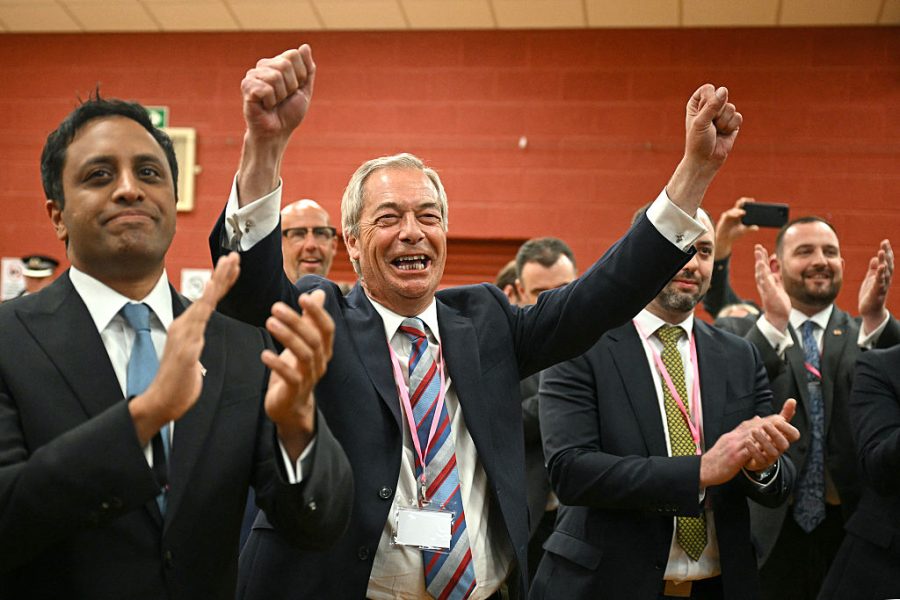The Reform party has won the Runcorn and Helsby by-election. It was announced this morning that they had captured the seat by a mere four votes, the closest result in British by-election history. Labour asked for a full recount – after which, it turned out that the Reform party had actually won the by-election by six votes (still making it the closest by-election result in British history).
This is a huge result in British politics. Reform has proven that electorally, they are for real. The polls aren’t wrong or soft – people will turn out and vote for them. Nigel Farage’s party is a genuine, massive threat to the British political order.
By-election wins are also a sign that a smaller party is on the rise.
I was in Runcorn over the weekend, speaking to activists and locals. What struck me were two main things. One, how dominated the centre of town seemed to be by Reform. Anyone who was willing to say how they were voting in the by-election (particularly in the Ferry Boat, the Wetherspoons on Church Street) said, unreservedly, ‘Reform’. When asked why, several said something along the lines of: ‘We need change. Tories and Labour have both failed; it’s time to give someone else a go’. They seemed proud to say they were voting Reform, as though it were a matter of honour to do so.
Twenty years ago, the electoral dynamics in a seat such as Runcorn and Helsby would have been a town centre heavily dominated by Labour, with the suburbs and any rural areas becoming increasingly Tory the more you headed out from the middle. Now, it seems like places such as Runcorn are owned by Reform in the centre, getting more and more Labour as you move into the increasingly affluent suburbs – with the Tories squeezed out along the way.
The other thing I noticed in Runcorn was how much bigger and more enthused Reform’s ground game seemed than Labour’s. Perhaps it was just what was happening on that particular weekend, of course, but it’s worth noting that it was the final weekend before polling day, when you would have expected everyone to be pushing hard. There were lots of Reform activists around, delivering leaflets and door knocking – I failed to see one Labour activist in the wild. And the Tories? I saw no sign of support for them anywhere in the constituency whatsoever, on any level.
It made me think at the time that what is likely to become the key political dynamic of this parliament is to what extent a Reform party that has massive enthusiasm behind it, with a burgeoning ground game, can overcome the various pluses Labour has going for them, namely a large group of voters who turn out for the party no matter what, as well as incumbency on a large scale. Runcorn indicates Reform are ahead of the curve already in that battle.
Let’s put this into some perspective: Runcorn is, in sheer psephological terms, Reform’s 387th target seat. In other words, on a pure national swing, you would expect Reform to end up with a majority not far from Labour’s current one if they are capturing Runcorn and Helsby.
Now, by-elections are by-elections, special in several ways. For one, it was being contested because the Labour MP had punched a constituent. Having to hold a by-election because of the misdeeds of the sitting MP always bakes in a disadvantage to the incumbent party. By-elections also favour smaller parties because they can put everything they’ve got into them, evening the battle out a little. You can’t do that in a general election where you’re spread across over 600 constituencies.
Yet by-election wins are also a sign that a smaller party is on the rise. The Liberal Democrats heralded their coming in the 1990s and 2000s with some huge by-election upsets. Yet this feels even bigger in some ways than those historic Lib Dem wins. Labour are not even a year into being the government, and yet one of their safest seats has been taken by a party that was polling at around 5 per cent this time last year.
The result is bad news for the Tories as well. While they never had a chance in Runcorn, Reform being this dramatically ahead of itself is bad news for the Conservative party overall. The Tories increasingly look irrelevant, something that could become worse as this parliament goes on.
Again, make no mistake, this is a massive moment in British politics, one that will be felt for a long time to come. Reform’s rise seems unstoppable, at least for now. Sure, politics is extremely volatile. Anything could happen. But if I were a Tory or Labour strategist, I would stop saying ‘Reform are a flash in the pan – they’ll fade out soon enough’ and start thinking seriously about how to stop Reform winning enough seats to form a government in a few years’ time.
Join us at Coffee House Shots Live: The local elections shake-up on Wednesday 7 May, with special guests Sir Jacob Rees-Mogg and Zia Yusuf. Book your tickets here








Comments